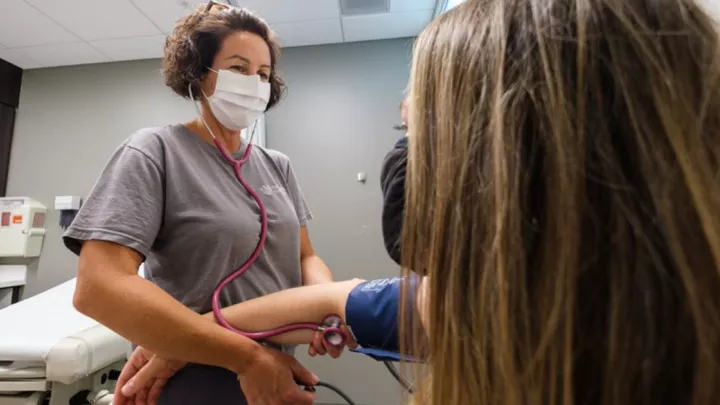COVID-19 can wreck your body, here's how

Information about the coronavirus is changing so rapidly, sometimes it’s difficult to know what is the latest and most accurate information. How does it affect your body? Can it have long-term effects?
We talked to one of our critical care specialists, Heather Strah, MD, to answer these questions and to help us paint a picture of what it’s like to be a coronavirus patient.
Right now we think 81% of coronavirus patients have had mild or no symptoms, 14% have required hospitalization and 5% have needed intensive care. Based upon current U.S. statistics, the virus will kill about 3.9% of people who get it.

For that 5% of coronavirus patients who require intensive care, the disease is very bad. Here’s how the coronavirus enters your body, attacks, and affects your organs.
Coronavirus enters the body through the nose, mouth or eyes. Once inside the body, it goes inside healthy cells and uses the machinery in those cells to make more virus particles. When the cell is full of viruses, it breaks open. This causes the cell to die and the virus particles can go on to infect more cells.
As the body tries to fight the infection, the immune system causes inflammation to make it hard for the virus to copy itself. The process of fighting the infection causes most of the symptoms people have. As the virus makes its way down to the lungs it can cause the lungs to become inflamed. This can lead to pneumonia.
In people with mild symptoms, the fever typically diminishes after a few days and they will likely feel much better after a couple of weeks. They may also have a lingering cough for several weeks.
“Any time you have a fever for five or more days, you should talk to your doctor,” says Dr. Strah. “Unlike the flu, where you get sick very rapidly, COVID-19 tends to come on slowly and then gets worse as it travels down to the lungs.”
-A cough
-Fever
-Shortness of breath
Please follow these instructions to be screened for COVID-19.
In patients who develop severe infection, shortness of breath becomes more intense after seven to 10 days of symptoms. That is because the virus has populated in the lungs where it causes inflammation. These are the patients that typically require hospital care, notes Dr. Strah.
As a result of inflammation and fluid buildup, fluid may leak into the tiny air sacks in the lungs. This can lead to a critical condition called adult respiratory distress syndrome (ARDS). This makes it very hard for the lungs to move oxygen from the air in the lungs to the bloodstream, which keeps organs from getting the oxygen they need to function.
The amount of oxygen being carried throughout the body by the blood cells is referred to as a person’s blood oxygen level. A normal oxygen level is 94% or more. Anything lower than 88% is considered low and requires oxygen support, notes Dr. Strah.
“The oxygen level for coronavirus patients often drops into the 60 to 70% range, which is lower than what we usually see in even our most critical patients,” she says.
One of the challenging aspects of the coronavirus is that shortness of breath can develop rapidly. As a result, “sometimes patients may not feel that badly until breathing difficulties have progressed to severe levels,” explains Dr. Strah. “This combined with fear of coming to the hospital can make people want to wait to come to the hospital until the last minute.”
Patients who require ventilator support are typically in the intensive care unit (ICU) for two to three weeks or more. “These patients can be very uncomfortable,” Dr. Strah notes. “To keep them safe and to protect their lungs, sometimes we have to medically paralyze them to improve the ability of the ventilator to take control of their breathing. They are also heavily sedated so they are not aware of what is happening. These patients are placed on their stomachs for 16 hours of the day. This has been shown to improve oxygen getting into the blood as it travels through the lung cavity.”
The longer patients are in the ICU, the more likely complications are to accumulate, notes Dr. Strah. As the organs weaken and the body becomes fatigued, the patient is more likely to develop pneumonia and other infections, requiring antibiotics. Some patients will develop very low blood pressure, a condition called shock, requiring additional medications. The kidneys may begin to fail due to low blood pressure. If the kidneys fail, the patient may need dialysis for a week or more. Dialysis is a process that imitates the job of the kidneys by filtering wastes and extra fluid from the blood. In some patients, dialysis may become permanent. The virus can also weaken the heart, which can be fatal for patients with existing heart conditions.
Time spent in the ICU can be devastating to the body. For every one day in the ICU, a patient typically needs three to five days of physical and occupational therapy to recover.
“It’s too early to know what the long-term effects of the coronavirus are going to be,” Dr. Strah says. “We think the majority of people who come off the ventilator and recover will be able to return to a relatively normal life. A small minority of patients may need specialized medical care, like oxygen or dialysis, for the rest of their lives.”
People who develop more severe cases of the coronavirus are also more likely to develop scarring of the lungs. This is a natural healing response by the body. This scarring is usually permanent and may not necessarily cause other health problems later down the road, Dr. Strah notes.
“One of the biggest challenges in treating this virus is the rapidly changing information regarding what we know about this disease,” explains Dr. Strah. “As a result, there is not a standard set of protocols. We still have a lot to learn about this virus, but we are slowly making progress and learning more and more about how to best treat these patients to achieve the best outcomes.”







